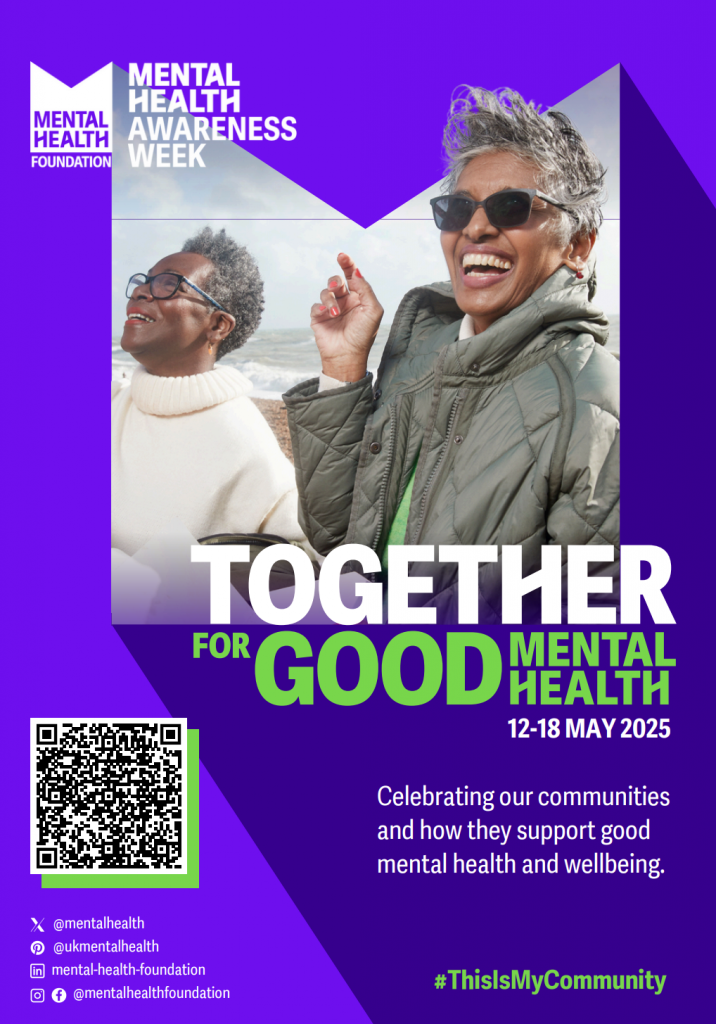
Since 2001, the Mental Health Foundation has been leading Mental Health Awareness Week – bringing the UK together to focus on getting good mental health. Mental Health Awareness Week is an annual event where the whole of the UK comes together to focus on achieving good mental health. The week aims to tackle stigma and provide people with the information and tools to understand and prioritise their own mental health. This year, the week takes place from 12 to 18 May 2025 and the theme is ‘community’.
Community can be defined in many ways, but when simplified down to its most important element, community is all about connection. Community is not just an entity or a group of people, it’s a feeling. It’s feeling connected to others, feeling accepted for who you are and feeling supported. Having connection can help us feel wanted and loved.
Being part of a community is vital for our mental health and wellbeing. We thrive when we have strong connections with others and supportive communities around us. People who are more socially connected to family, friends, or their community are happier, physically healthier, and live longer, with fewer mental health problems than people who are less well connected.
Help and advice are available on the Mental Health Foundation website including tips on how to get involved in your community. They will be providing expert information and guidance on how community supports good mental health, providing ideas for how to cultivate mentally healthy communities, sharing inspiring stories from communities across the UK, and encouraging people and organisations to get involved with activities and events.
The Library collections contain print and online resources on the topic of mental health. Resources can be found by searching in the Library’s search tool, Discover. Print books on mental health can be found in the Barnard Room, shelf mark UJ…A selection of books from this section are on display in the Library’s Reading Room as follows:
Bansford, John, National Research Council . Committee on Developments in the Science of Learning., and National Research Council . Committee on Learning Research and Educational Practice. How People Learn : Brain, Mind, Experience and School. Expanded ed. Washington, DC: National Academy Press, 2000. Print.
Cattan, Mima, and Sylvia Tilford. Mental Health Promotion : A Lifespan Approach. Maidenhead, England ; McGraw Hill/Open University Press, 2006. Print.
Clarkson, Petrūska. How to Overcome Your Secret Fear of Failure. London: Vega, 2003. Print.
Covey, Stephen R. The 7 Habits of Highly Effective People : Personal Workbook. London: Simon and Schuster, 2005. Print.
Harris, Russ. The Happiness Trap : Based on ACT – a Revolutionary Mindfulness-Based Programme for Overcoming Stress, Anxiety and Depression. London: Robinson, 2008. Print.
Lucas, Bill. Power up Your Mind : Learn Faster, Work Smarter. Clerkenwell: Nicolas Brealey, 2001. Print.
McKenzie, Kwame, and Trudy Harpham, eds. Social Capital and Mental Health. London ; Jessica Kingsley Publishers, 2006. Print.
Palmer, Stephen, and Angela Puri. Coping with Stress at University : A Survival Guide. London: SAGE, 2006. Print.
Perry, Andrea. Isn’t It about Time? : How to Stop Putting Things off and Get on with Your Life. London: Worth, 2002. Print.
Patel, Vikram et al. Global Mental Health : Principles and Practice. Ed. by Vikram Patel et al. New York, NY: Oxford University Press, 2014. Print.
Scikszentmihalyi, Mihaly. Flow : The Classic Work on How to Achieve Happiness ; [with a New Introduction by the Author]. Rev. and updated ed. London: Rider, 2002. Print.
Sorel, Eliot. 21st Century Global Mental Health. Boston: Jones & Bartlett Learning, 2013. Print.






